Federal Court Declares Portion of Mississippi’s Constitution Unconstitutional
Permanent felon disenfranchisement is unconstitutional.
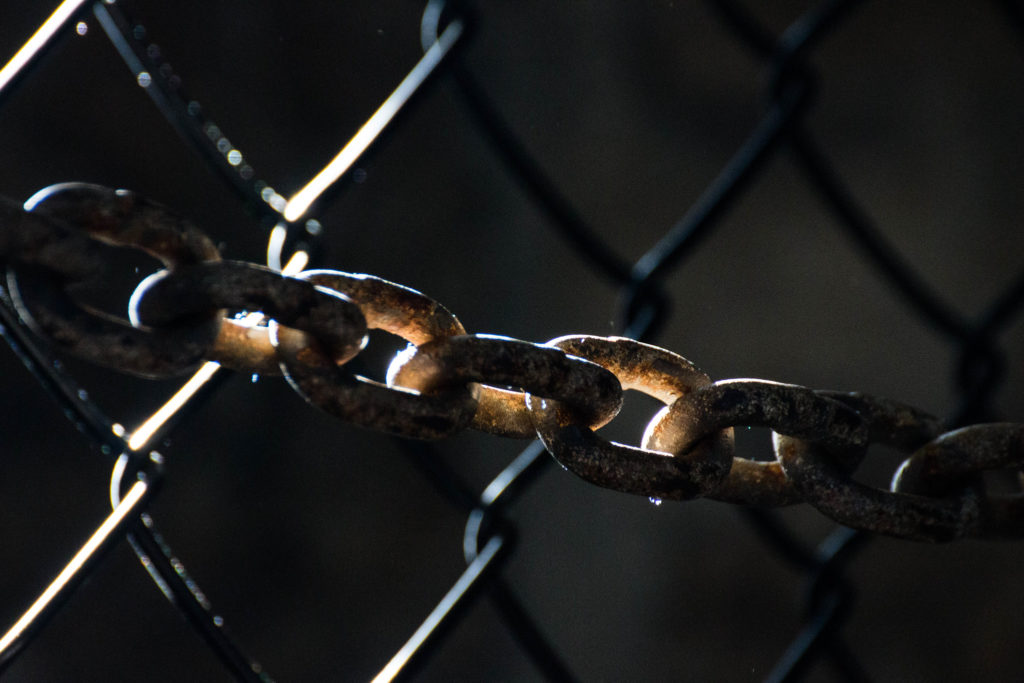
Via NBC News/Reuters: Mississippi cannot strip convicts of right to vote, federal appeals court rules.
A 2-1 panel of the New Orleans-based 5th U.S. Circuit Court of Appeals faulted a provision of Mississippi’s state constitution that mandates lifetime disenfranchisement for people convicted of a set of crimes including murder, rape and theft.
Siding with a group of convicts who sued in 2018 to regain their right to vote, U.S. Circuit Judge James Dennis wrote that the state’s policy violated the U.S. Constitution’s Eighth Amendment, which bars cruel and unusual punishments.
He said the state’s constitutional provision, Section 241, served no legitimate purpose, ensures former offenders are never fully rehabilitated, and was adopted in 1890 after the U.S. Civil War to “ensure the political supremacy of the white race.”
The provision, whose list of disqualifying crimes had been amended twice in the years, remained effective in achieving its “racially discriminatory aim,” Dennis said. Of the nearly 29,000 Mississippians convicted of disenfranchising offenses who had completed their sentences from 1994 to 2017, 58% were Black, he said.
It has long struck me as indefensible that someone who has served their time should continue to be punished by having their right to vote taken away permanently. If you have served your time, you have served your time. This is doubly true when we consider the clear racist motivations behind these clauses originally.
Some previous posts on this subject:

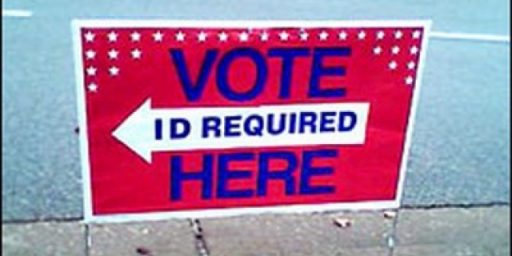
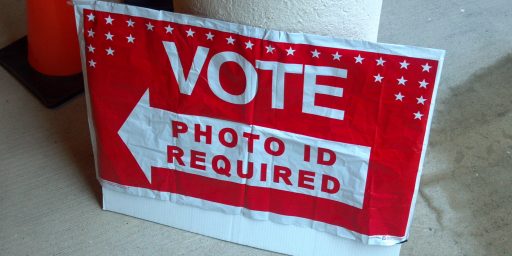
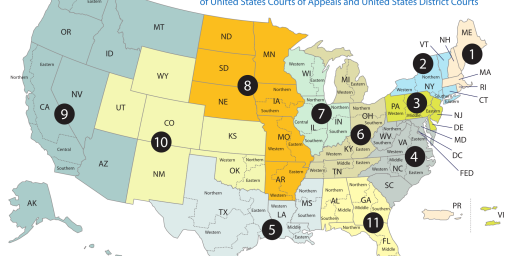
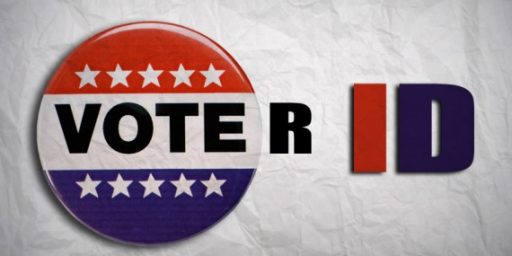
I agree that it’s unjust and counterproductive. After all, once they’re out of prison, it’s in everyone’s interest that they become productive citizens. Having a stake in the polity is surely part of that.
I’m skeptical that it’s unconstitutional, though. It’s been a fairly widespread practice since the Framers were alive, although it is falling out of favor. I’d be surprised if the ruling survives the full 5th Circuit, let alone SCOTUS.
@James Joyner:
I understand where you are coming from, but my thinking on this has moved to the point wherein I am unconvinced that the appropriate way to interpret the constitution is to assume that old views are superior to newer ones.
Having said that, I would not be surprised is the ruling was overturned.
I have trouble comprehending that a US citizens constitutional rights vary depending on which state you live in. Then again, despite popular opinion, voting is not a constitutional right?
@Scott:
Short answer, voting in Federal elections a regulated constitutional right. It’s largely established through the post Civil War amendments.
Unfortunately the Supreme Court has long found that Felony Disenfranchisement is legal.
So basically 100% what James wrote. Unless the Supreme Court is prepared to revisit the topic and reverse itself or modify its position, this week be overturned.
@Steven L. Taylor:
Boy howdy, you’d make a lousy Federalist Society judge. You have the temerity to suggest that conditions have changed since 1790, or that we might have learned something since?
On a related subject, NYT has a story about Clarence Thomas. He likes to talk about RV camping in Walmart parking lots with his fellow common folk. NYT has questions about how he, or someone, paid for the quarter million dollar Prevost bus conversion RV he claims to do it in. It’s good to be a justice.
The most interesting thing about the article is that NYT dug out the story themselves instead of waiting for Pro Publica.
I would go way further.
No citizen should ever be denied the right to vote. Yes, every person in prison should be guaranteed a vote. Who is more impacted by the laws that Congress has passed (so many of them biased, disproportionate, and racist) than those who are most affected by them?
8% of US citizens have a felony conviction. That goes up to an astounding 33% among blacks. Think about that. Even if voting rights were only suspended while incarcerated, that would still preclude 2.3M black Americans from voting.
Voting by any adult citizen is the one right that should never have exceptions.
@Mu Yixiao:
I wish I could give this more than one upvote. Yes to everything you said for so many reasons–from philosophical ones to political ones (like the impact of prison gerrymandering in helping rural areas gain overrepresentation) to criminological ones (re-enfranchisement has been strongly correlated through numerous studies with lower recidivism rates).
Yup, and that’s why the majority of codification of felony disenfranchisement laws occurred during our incomplete Restoration period. And the majority of them continue to appear in their harshest form to this day in former slave-owning states (note that is despite the shift in political power from party to party in those states).
Unfortunately, there is the issue of the text of the section 2 of the 14th amendment:
That has been used to defended Felony Disenfranchisement for years. And in 1974 the Supreme Court upheld this in Richardson v. Ramierez. Given the Supreme Court still find the death penalty constitutional, barring an act of Congress, it’s hard to imagine they would see lifetime disenfranchisement as unconstitutional. This is very sad and another reminder of how addicted we are as a culture to forever punishment.
As a result an estimated 5.5 million Americans are deprived of voting rights. For more on the topic see: https://www.sentencingproject.org/app/uploads/2022/08/Locked-Out-2020.pdf
@Mu Yixiao:
Hear, hear.
I’ll take you one further — we should adopt the Australian position that voting is mandatory for all eligible citizens. If you want to vote for “Mickey Mouse” or “None of the above” that’s fine — but you have to vote or be fined, and it will be made as easy as possible to do.
(I have some ideas about what should happen if “None of the above” wins a plurality…)
@DrDaveT:
No.
That would make it a requirement, not a right.
I was living in China during the 2020, but if I were in the US. I wouldn’t have voted.
I explicitly disagree with the idea that you can “vote against someone”. There is nowhere on the ballot that where you can say “no”. The only option is to say “yes”. I didn’t want Trump in the White House. I didn’t want Hillary in the White House.
A requirement to vote would be forced speech. Worse, it would be forced participation in politics, in which there is, effectively, only two choices–for the most powerful position in the world. Do you *really* want people who have zero political education, zero understanding, and zero care deciding who sits behind the Resolute Desk?
It’ll never happen, but what I would like to see are two additions to the ballot:
1) A “no” vote for every candidate. Every person can cast a single vote for each seat, and for only one candidate–but that vote can be either a “yes” or a “no” (+1 or -1). Everyone would actually be allowed to vote against a candidate.
2) An actual “None of the above”. This would count as a negative vote for every candidate listed.
In both of these scenarios, a candidate who gets less than X can not hold office during that election cycle.
More realistically? Ranked Choice Voting in all state and federal elections, and presidential electors being assigned based on congressional districts (for electors based on House districts), and percentages (for the two Senate-based electors).
No more Winner Takes All. Bonus? It wouldn’t require a Constitutional Ammendment.
@Mu Yixiao:
Isn’t this the status quo?
—
The solution is to make voting a requirement and adopting your proposal of adding a “none of the above” option or a “no” option for each candidate.
Your forced speech objection also no longer exists post-adoption because casting a negative vote is the same act as refusing to vote as protest. It’s arguably more effective than non-vote-as-protest because your voice is actually counted meaningfully. It’s shown in the results.
—
I imagine that RCV is quite popular with the OTB cohort and is certainly not mutually exclusive with mandatory ballots.
@DrDaveT:..voting is mandatory for all eligible citizens.
Force citizens to vote or be punished! What will the punishment be? A fine? If a citizen refuses to pay the fine, what then? Jail? What about repeat offenders? This will have to apply to all elections. Federal, State, County including School Boards all the way down to the dog catcher. Will parents who send their children to parochial school be required to vote for the public school board in their district? Will there be exceptions for those whose religion frowns on participation in the secular government? And if they don’t have to vote why do I?
Are threats of incarceration and intimidation the proper methods to convince citizens to excersize their franchise?
How does compelling a citizen to march to the polling place and then suggest that they can leave the ballot blank, which would be a violation of compulsory voting, engender respect for the law?
Maybe election workers will be charged to inspect every ballot before it is cast to be sure no one submits a blank ballot.
@Mu Yixiao:
Citizenship comes with responsibilities as well as rights. I’m OK with that. And I explicitly included a “none of the above” option in my proposal, so your concern about forced speech doesn’t apply.
We agree completely about ranked choice voting. There have been elections in the past where I would have voted for “none of the above” with subsequent second and third choices.
@Mu Yixiao:
Fielding this one separately, as it is importantly different from the others:
Yes, I would rather have ALL of the ignorant and misinformed voting, rather than only the angriest and most conspiracy-prone of them. That seems like a no-brainer to me.
And another thing!!!
Let’s not forget about primary elections. Different states, different laws. When I voluntarily visit my polling place on primary election day in Illinois I do have to publicly select a ballot for one party or another. Some people don’t want to make that choice public. So they do not vote in a primary but will vote in a general election. What will their punishment be for maintaining their privacy?
Some states require that a voter register as a member of a political party to vote in a primary election. Apparently advocates for compulsory voting not only want to force citizens to vote but also want to compel citizens to join a political party. What will the punishment be for not joining a political party?
I want to know!
When I vote in any election I get a receipt* that proves participation in the contest. I carry it with me at all times. I guess it won’t be long and the election police will be stopping me on the street and ask for my “papers please”. At least I’ll have the proper documentation to avoid arrest and incarceration.
*I’m not talking about a sticker that says “I Voted”. I refuse those. I don’t need one. I know that I voted.
@Mu Yixiao:
On the other hand, who should have less say in what those laws are than people who have preyed on their neighbors by violating those same laws?
(FTR and for the most part, I’m inclined away from disenfranchising convicts–because of the bias, disproportion, and racism–but believe it’s important to realize that this street runs in both directions.)
@DrDaveT: You’ll need to make the fine pretty high to get me interested in paying it. Beyond that, what difference does it make whether I don’t vote or turn in a white ballot?
@Mister Bluster:
Different question: How sure are you that you WANT parents who send their children to parochial, Christian, evanglically free church-sponsored schools, madrasas, yeshivas, and so forth to be electing the people on the school board?
@DrDaveT:
In this case, I’m not sure that means what you think it means. 😉
@Just nutha ignint cracker:..How sure are you that you WANT parents who send their children to parochial, Christian, evanglically free church-sponsored schools, madrasas, yeshivas, and so forth to be electing the people on the school board?
Are you asking me? I don’t want anyone to be forced to vote. If someone wants to vote for the local school board I will not make any effort to stop them. I do not advocate that voters be questioned about their beliefs before they vote for candidates for any office.
Voter turnout in Jackson County, Illinois for the General Election November 8, 2022 was 51.89%, 17,355. It’s a good thing that the Sherrif and his deputies did not have to round up and arrest the remaining 16,092 registered voters who did not cast a ballot the next day because I don’t think that the county jail could hold them all. Maybe they could keep them in the Banterra Center on the SIU Campus.
@Just nutha ignint cracker:
I’m pretty sure that’s a slippery slope you don’t want to start down. I’m an admitted elitist, but I know better than to let anyone start deciding who is qualified to vote.
@Kurtz:
Not in the slightest. Those who are voting are voting for something. Whether you think that something is good or bad is beside the point.
The last election (a mid-term) saw just under 70% of the eligible population voting. So 30% couldn’t be arsed to go to the polls. If forced to vote, they wouldn’t be voting based on knowledge about anything. It’s a pretty good bet they’d be voting for whomever had the loudest megaphone.
In this round, that would be Trump.
@DrDaveT:
Ah. So you would require that all the angry and conspiracy-prone citizens vote.
You seem to think that the people who aren’t voting are all on your side. If you implemented your idea, I think you might be very surprised.
@Kurtz:
No. It isn’t.
Being forced to cast a vote is being forced to speak. It doesn’t matter if that speech is for something or against it. It is still forced speech.You are being forced to say something (yes or no).
@Just nutha ignint cracker:
Okay. So you believe that parents who get gender-affirming care for their transgender children, or women who have abortions (or those who assist them in having abortions in any way)–in violation of state felony laws–should be deprived of the right to vote.
Noted.
And… anyone who has ever been convicted of smoking weed–even if it’s legal in their state–should never be allowed to vote again.
And anyone who has been convicted of blatantly racist laws should never be allowed to vote again.
Laws against murder, rape, assault, fraud, etc., aren’t going to be recinded if felons are allowed to vote.
Drug laws, sex laws, and other puritanical laws (which are enforced with a massive racist bias) where there is no victim just might. And that’s a good thing.
What you’re saying is: “The people who do things I don’t like should be tossed away and silenced; they don’t deserve the same rights as us ‘correct’ people”.
To which I say: Bullshit. Absolutely every citizen should get a vote. That’s what it means to be a citizen.
@Just nutha ignint cracker:
I’m heading off for the night, but… Would you care to let everyone know, specifically, which citizens should be deprived of their rights, based on the decisions made by the old, white, rich people in Congress? And, if voting is on the chopping block, which other rights are you okay with depriving them of? Searches/seizures? (Can a city just take a felon’s house?) Self incrimination? Due process? Equal rights? Association? Free speech?
I look forward to sitting down tomorrow morning and reading all about your ideas regarding who should be second-class citizens, which
rightsprivileges you would allow them to have, and the criteria by which you and yours would make these decisions.I have been out of this convo, but for the record:
1. I am in favor of felons voting, even while incarcerated.
2. I am not in favor of mandatory voting (there is actually a pretty deep literature on this that suggests it really doesn’t produce the effects you might think that it does. In simple terms, as I recall, high voter turnout countries that implement it continue to be higher voter turnout countries, and low voter turnout countries that implement it continue to be low voter turnout countries, with some minor variations. In short: not worth it and enforcement is a combo of toothless and a major pain).
@Mu Yixiao: @DrDaveT: Allow me to repeat myself:
Still, please feel free to believe anything you want about my motives, intelligence, or whatever else because I’m just here to provide the alternative viewpoint and am out of FTG about your reactions to it.
@Mu Yixiao:
They already do, to a first approximation.
No, I think they’re a somewhat random mix. Or, more precisely, the ignorant and misinformed are a fairly uniform random mix, of which currently only the wingnuts/MAGAts/X-filers are energized enough to always vote. So yes, the unvoting ignorant and misinformed skew somewhat toward reality, but not entirely.
I doubt it. But, if so, we would at least know more than we know now about the State of the Union.
@Just nutha ignint cracker:
Not sure what I said to get lumped in there, but if I gave offense I apologize — it was not intentional. My only point was that once we start trying to specify who has The Right Stuff to vote, we end up in bad places pretty quickly. Even though I would love to restrict the vote to (say) people who can factor a quadratic equation and compose a sonnet that scans…
@Just nutha ignint cracker re: @Mu Yixiao: @DrDaveT: Having taken a few deep cleansing breaths, I’ve decided to approach this question from a different angle (although I’ve been out of FTG about this question for about 25 years or so). Why do you think that your interests will be served by trying to get me to cast a ballot? Do you really believe that, given the motives you ascribe to my statement, that my ballot will advance the cause of democracy and good governance? Is it really to the interests of the nation for ignorant bigoted crackers and cracker adjacents a voice in the decision (and remember, I’m the guy who just “came out”* as wanting to deny parents of LBGTQRSTUVWYZ++==–s the ability to protect their children from the hoards of people like me by disenfranchising said parents as criminals)?
And don’t for a minute kid yourselves that allowing “no” or “none of the above” makes a rat’s heinies worth of impact in changing the fact that stupid voters are going to attract stupid candidates and make stupid decisions about putting those stupid people in power. All that my vote does is dilute the likelihood that you’ll get a good result.
Think first. You’ll come up with a better system. But stop thinking that my staying home is thwarting good government. It’s probably just the opposite.
*pun intended
@DrDaveT: I’d be fine with that requirement given that the only thing I’m worse at than writing poetry (lyric or otherwise) is quadratic equations.
[Composed this any number of hours ago and just came back to the computer and noticed I forgot to hit send. Still relevant to the top level post but we seem to have moved on from that, so this is just for the record]
@James Joyner: If I understand the ruling correctly, it was specifically because it was more likely to affect African Americans than any other group. As far as I know they didn’t assume intent, but rather just looked at the outcomes. Bottom line, it was the the racial aspect and not ruled as unconstitutional on its own.
@MarkedMan: Which actually makes the ruling weirder in my view. Dennis said the provision was intended to ensure white supremacy, which wouldn’t surprise me. If so, there’s a good argument that it violates the 15th Amendment. Instead, he ruled that it violated the 8th Amendment’s bar on cruel and unusual punishments. It’s neither cruel nor unusual.
@Steven L. Taylor: @gVOR10: I think laws should change to meet the evolving needs of the society. I’m skeptical that the meaning of words written in 1787 or 1789 should change based on the whims of current judges.
@James Joyner:
Sadly, both the 15th and the 8th seem unworkable given current decisions.
In the case of the 8th, the Court maintains that the death penalty isn’t cruel and unusual. I don’t see how this survives that scrutiny. Perhaps if you swing you could argue that it is unusual because only a few States, less than 7 if memory serves practice lifetime Disenfranchisement. But the dog isn’t going to hunt.
And with the 15th, even though the modern rules trace themselves back to white supremacy, the present court will most likely find it is applied in a “race neutral” way. This would mirror a recent court decision that is slipping my mind at the moment.
@James Joyner:
I just am not convinced that the words in question have a fixed meaning–or that they had a clear, concretized certainty about them even when they were written.
Moreover, if trying to address baked-in white supremacy is a “whim” then we are really in trouble.
@James Joyner: But I do take your argument about “cruel and unusual” and agree this is likely not to withstand higher review.
I agree that the 15th makes more sense and, really in my mind, the 14th. But, alas, we (collectively) will prefer some patina of respecting the Founders (or whatever logic the “originalists” wish to apply) and let stand an obvious injustice wherein some citizens are treated differently than others because it suits the current power status quo in Mississippi.